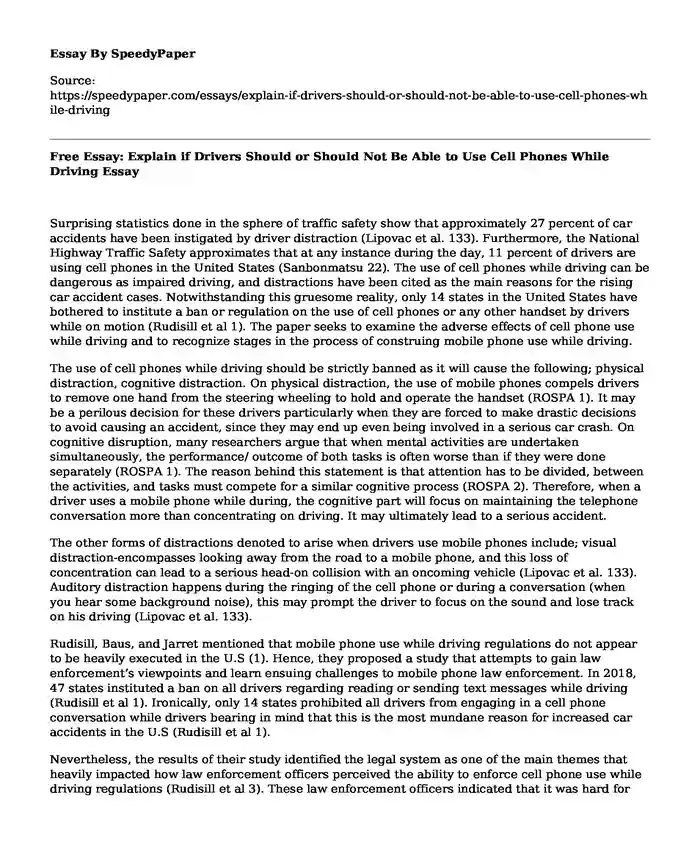
| Essay type: | Argumentative essays |
| Categories: | Risk Electronics Automotive industry Healthcare |
| Pages: | 3 |
| Wordcount: | 801 words |
Surprising statistics done in the sphere of traffic safety show that approximately 27 percent of car accidents have been instigated by driver distraction (Lipovac et al. 133). Furthermore, the National Highway Traffic Safety approximates that at any instance during the day, 11 percent of drivers are using cell phones in the United States (Sanbonmatsu 22). The use of cell phones while driving can be dangerous as impaired driving, and distractions have been cited as the main reasons for the rising car accident cases. Notwithstanding this gruesome reality, only 14 states in the United States have bothered to institute a ban or regulation on the use of cell phones or any other handset by drivers while on motion (Rudisill et al 1). The paper seeks to examine the adverse effects of cell phone use while driving and to recognize stages in the process of construing mobile phone use while driving.
The use of cell phones while driving should be strictly banned as it will cause the following; physical distraction, cognitive distraction. On physical distraction, the use of mobile phones compels drivers to remove one hand from the steering wheeling to hold and operate the handset (ROSPA 1). It may be a perilous decision for these drivers particularly when they are forced to make drastic decisions to avoid causing an accident, since they may end up even being involved in a serious car crash. On cognitive disruption, many researchers argue that when mental activities are undertaken simultaneously, the performance/ outcome of both tasks is often worse than if they were done separately (ROSPA 1). The reason behind this statement is that attention has to be divided, between the activities, and tasks must compete for a similar cognitive process (ROSPA 2). Therefore, when a driver uses a mobile phone while during, the cognitive part will focus on maintaining the telephone conversation more than concentrating on driving. It may ultimately lead to a serious accident.
The other forms of distractions denoted to arise when drivers use mobile phones include; visual distraction-encompasses looking away from the road to a mobile phone, and this loss of concentration can lead to a serious head-on collision with an oncoming vehicle (Lipovac et al. 133). Auditory distraction happens during the ringing of the cell phone or during a conversation (when you hear some background noise), this may prompt the driver to focus on the sound and lose track on his driving (Lipovac et al. 133).
Rudisill, Baus, and Jarret mentioned that mobile phone use while driving regulations do not appear to be heavily executed in the U.S (1). Hence, they proposed a study that attempts to gain law enforcement’s viewpoints and learn ensuing challenges to mobile phone law enforcement. In 2018, 47 states instituted a ban on all drivers regarding reading or sending text messages while driving (Rudisill et al 1). Ironically, only 14 states prohibited all drivers from engaging in a cell phone conversation while drivers bearing in mind that this is the most mundane reason for increased car accidents in the U.S (Rudisill et al 1).
Nevertheless, the results of their study identified the legal system as one of the main themes that heavily impacted how law enforcement officers perceived the ability to enforce cell phone use while driving regulations (Rudisill et al 3). These law enforcement officers indicated that it was hard for them to enforce these laws, since they have to prove their case, and the judges might fail to agree with their statements. The other specific limitations to the enforcement of these laws include; cultural norms, lack of apparent support from courts/ judges, the requirement for an overarching distracted driving law, and the need to maintain a positive relationship with the public (Rudisill et al 1).
Conclusion
Mobile phone use while driving is pervasive, and the major reason behind the increasing cases of car accidents in the U.S. The essay has been able to examine several types of distractions that the use of handheld cell phones causes drivers to have an increased probability of causing an accident. These distractions include; physical, cognitive, auditory, and visual distractions. While law enforcement officers have not been able to enforce the CWPD laws due to the following facts; cultural norms, lack of apparent support from courts/ judges, and the requirement for an overarching distracted driving law.
Works Cited
Lipovac, Krsto, et al. "Mobile phone use while driving-literary review." Transportation research part F: traffic psychology and behavior 47 (2017): 132-142. file:///C:/Users/User/Downloads/01.Lipovacetal.2017_Mobilephoneusewhiledriving-literaryreview.pdf
ROSPA. “The Risk of Using a Mobile Phone While Driving.” 1-40. http://www.rospa.com/rospaweb/docs/advice-services/road-safety/drivers/mobile-phone-report.pdf
Rudisill, Toni Marie, Adam D. Baus, and Traci Jarrett. "Challenges of enforcing cell phone use while driving laws among police: a qualitative study." Injury prevention 25.6 (2019):1-7. file:///C:/Users/User/Downloads/focusg_InjPrev.pdf
Sanbonmatsu, David M., et al. "Why drivers use cell phones and support legislation to restrict this practice." Accident Analysis & Prevention 92 (2016): 22-33. https://pdfs.semanticscholar.org/0c5d/ccf0ec17bf05965ec3708671b3fa0aef7a2c.pdf
Cite this page
Free Essay: Explain if Drivers Should or Should Not Be Able to Use Cell Phones While Driving. (2023, Aug 27). Retrieved from https://speedypaper.com/essays/explain-if-drivers-should-or-should-not-be-able-to-use-cell-phones-while-driving
Request Removal
If you are the original author of this essay and no longer wish to have it published on the SpeedyPaper website, please click below to request its removal:
- Free Essay Sample: Organizational Communication and Social Media
- Automotive Industry Analysis - Free Essay
- Munchausen by Proxy Cases, Free Essay in Psychology
- Free Essay Sample on Drugs Use in Sports
- Essay Sample on The Relationship Between Industrialization and the Spread of Disease
- Essay Example: Research on Nursing Grand Rounds
- Free Essay Sample: Death Certificates
Popular categories




